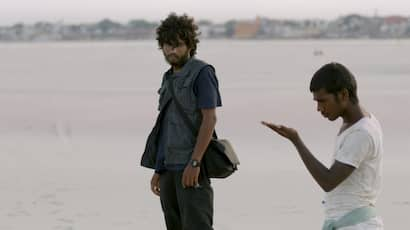Jio MAMI 2023: Kashmiri Pandit director sparks a philosophical pause with Varanasi film

Jio MAMI 2023: Kashmiri Pandit director sparks a philosophical pause with Varanasi film
Rajesh S Jala’s personal experiences as a Kashmiri Pandit, uprooted from his home due to the militancy in Jammu and Kashmir in the early ’90s, have significantly influenced the narrative of his debut feature film, “The Spark (Chingari).” His firsthand encounters with violence during his youth in Kashmir have provided him with a deeply personal and poignant perspective, which he has channeled into the script for this film.
The inspiration for the film was further fueled by Jala’s observations of disturbing incidents, particularly related to lynching, which he encountered through various media. This exposure served as a catalyst for his desire to create a narrative that would serve as a reminder of India’s longstanding history as a compassionate society, emphasizing the cultural and spiritual legacy that the country has fostered over the centuries.
By choosing the ancient city of Varanasi as the setting for the film, Jala underscores the city’s global renown for its spiritual significance and cultural richness. This choice not only adds a profound and symbolic layer to the film but also establishes a rich backdrop against which the narrative can unfold, emphasizing the film’s thematic exploration of compassion and societal violence. Through the amalgamation of personal experiences and a poignant narrative, “The Spark (Chingari)” promises to be a compelling and thought-provoking cinematic experience.
“The Spark” appears to be a compelling exploration of the existential quest for purpose and meaning, as portrayed through the lives of its diverse and intriguing characters. The film’s inclusion in the prestigious Jio MAMI Mumbai Film Festival, particularly within the Focus South Asia category, is a testament to its thematic depth and artistic merit. By delving into the stories of three individuals, each on their own unique journey of self-discovery, the film offers a nuanced perspective on the intricacies of life and the human experience.

Kabir, the young filmmaker, serves as a lens through which the audience can witness the narratives of the other two central characters, Durga and Amma. Juxtaposing the fictional elements of Kabir’s filmmaking process with the real-life accounts of Durga, a crematorium worker, and Amma, an elderly pilgrim, adds an extra layer of authenticity and depth to the film. This blend of fiction and non-fiction not only blurs the lines between reality and imagination but also contributes to the film’s immersive and thought-provoking narrative.
Jala’s discovery of Durga and Amma in Varanasi and their subsequent incorporation into the film underscores the director’s commitment to capturing genuine human experiences and emotions. By highlighting the lives of these real individuals within the context of the larger narrative, “The Spark” promises to offer a compelling and authentic portrayal of the human condition, touching upon themes of mortality, purpose, and the intrinsic interconnectedness of all lives.
“The Spark” continues to demonstrate its intricate narrative layers, this time delving into the complex storyline involving the character of Kabir, brilliantly portrayed by theater actor Puneet Sarawat in his film debut. The film’s exploration of Kabir’s contemplation of vengeance and justice, intertwined with the assistance of Ahmed, played by Sanjay Suri, adds a compelling dimension to the narrative, offering a dynamic blend of tension and introspection.
With a deliberate emphasis on minimal dialogue and a select number of characters, the film’s focus on the interplay between Kabir and Ahmed further accentuates the depth and complexity of their motivations and actions. The deliberate choice of maintaining a sparse narrative allows the audience to immerse themselves in the intricate emotional landscape of the characters, while the use of sound and imagery from Varanasi’s iconic ghats serves as a powerful tool in shaping the film’s experimental cinematic style.
The production of “The Spark” under the banner of The Elements, Jala’s independent production house, in collaboration with Inquilab Studio, highlights the dedication and perseverance of the creative team in bringing the film to fruition, despite the constraints posed by a limited budget. The challenges faced during the production process serve as a testament to the filmmakers’ commitment to realizing their artistic vision within the intricate cultural and philosophical tapestry of Varanasi. By weaving together the city’s rich history and tradition, Jala successfully infuses the film with a profound exploration of life, death, and the existential contemplations that resonate within the ethos of the ancient city.
The portrayal of Varanasi and its intrinsic connection to the film’s philosophical exploration serves as a testament to Rajesh S Jala’s artistic vision and his commitment to capturing the essence of the city’s spiritual and cultural heritage. By infusing the character of Varanasi, along with its profound historical significance, into the narrative, Jala establishes a compelling backdrop that not only enriches the film’s thematic depth but also serves as a catalyst for its philosophical inquiry into life, death, and existential contemplation.
The choice to name the lead character after Kabir, the renowned 15th-century Sufi poet from Varanasi known for his teachings of religious harmony, further emphasizes the film’s thematic focus on unity and interconnectedness. Jala’s background in documentary filmmaking, marked by his earlier works such as “Floating Lamp of the Shadow Valley” and “Children of the Pyre,” reflects his enduring commitment to blending fiction and non-fiction to create authentic and poignant narratives that resonate with audiences on a profound level.
The disruption caused by the COVID-19 pandemic, leading to a significant delay in the production of “The Spark,” underscores the challenges faced by the filmmaking process during these unprecedented times. However, the film’s eventual completion and its subsequent recognition and premiere at the Busan International Film Festival in October 2023 within the New Currents section, a category highlighting emerging talents in the Asian film industry, signify the film’s critical acclaim and Jala’s growing influence as a filmmaker within the international cinematic landscape.



